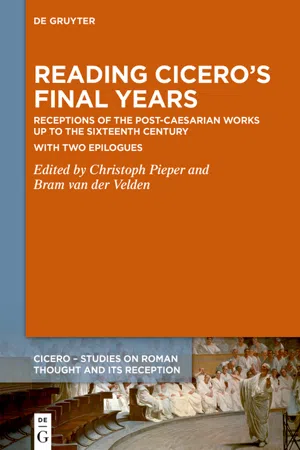
Reading Cicero's Final Years
Receptions of the Post-Caesarian Works up to the Sixteenth Century – with two Epilogues
Christoph Pieper, Bram van der Velden, Christoph Pieper, Bram van der Velden
- 311 Seiten
- English
- ePUB (handyfreundlich)
- Über iOS und Android verfügbar
Reading Cicero's Final Years
Receptions of the Post-Caesarian Works up to the Sixteenth Century – with two Epilogues
Christoph Pieper, Bram van der Velden, Christoph Pieper, Bram van der Velden
Über dieses Buch
In der Reihe CICERO – Studies on Roman Thought and Its Reception erscheinen Monographien, Sammelbände, Editionen oder Kommentare zu allen Aspekten der römischen Philosophie, Geschichte, Rhetorik, Politik, Rechts- und Kulturgeschichte sowie deren Rezeption, einschließlich der Patristik und christlichen Philosophie.
M. Tullius Cicero, der Namensgeber der Reihe, steht mit seinem Wirken nicht nur als Politiker, sondern auch als Redner und Philosoph für die thematische Vielseitigkeit und Interdisziplinarität dieses Publikationsorgans.
Die Basler Stiftung Patrum Lumen Sustine ist die herausgebende Institution der einem Peer-Review-Prozess unterliegenden Reihe, die wissenschaftliche Aufsicht liegt bei der Société Internationale des Amis de Cicéron (SIAC, Paris).
Reihenherausgeber
Ermanno Malaspina
Wissenschaftlicher Beirat
Mireille Armisen-Marchetti, Francesca Romana Berno, Carmen Codoner, Perrine Galand, Henriette Harich-Schwarzbauer, Robert Kaster, David Konstan, Carlos Lévy, Sabine Luciani, Rita Pierini, Mortimer Sellers, Jula Wildberger
Redaktion (für Fragen und/oder Einreichungen von Manuskripten)
Veronica Revello ( [email protected])
Häufig gestellte Fragen
Information
Second Epilogue
The sixteenth century: Erasmus and Lipsius
Fatebor eloquentem, qui Ciceronem feliciter expresserit: sed qui totum, exceptis uiciis: et ne sim iniquior, una cum ipsis uiciis, modo totum. Feremus illud subinane, feremus mentum leua demulceri, feremus et collum oblongum atque exilius, feremus perpetuam uocis contentionem, feremus indecoram parumque uirilem in initio dicendi trepidationem, feremus iocorum intemperantiam: et si qua sunt alia, in quibus M. Tullius uel sibi, uel aliis displicuit, modo simul et illa exprimant, quibus ista uel texit ille, uel pensauit.3
I will acknowledge him eloquent who copies Cicero successfully; but he must copy him as a whole and his very faults too. I will put up with that suggestion of emptiness, that stroking of the chin with the left hand, the long and thin neck, the continual straining of the voice, the unbecoming and unmanly nervousness as he begins to speak, the excessive number of jokes, and everything else which in Cicero is displeasing to himself or to others, provided only he copy those other traits too by which he concealed these or compensated for them.
Non laudatur ab omnibus Cicero? Fateor, sed sic, ut eloquens, ut facundus, ut disertus patronus; quae laudes ejusmodi sunt, ut uel de Catilina, uel de Clodio, perditis ciuibus, et quos ipsos ualuisse dicendo accepimus, ne inimici quidem jejunius dixerint. […] Cujus [sc. Ciceronis] tamen, si recte consideremus, non minorem gloriam integerrima uita quam laudem eloquentia meruit.11
Is Cicero not praised by everyone? Yes, I admit it, but he is praised as an eloquent, articulate and well-spoken advocate. Praise of this kind might also be bestowed on Catiline or Clodius, wretched citizens of whom we learn that they too were good at speaking. […] But if we judged the matter rightly, we would discover that Cicero’s most blameless life makes him worthy of as much renown as his eloquence makes him worthy of praise.
Inhaltsverzeichnis
- Title Page
- Copyright
- Contents
- Summary of the Chapters
- Introduction Caesar’s death: a new beginning of history?
- Were Cicero’s Philippics the Cause of his Death?
- The Thrill of Defeat Classicism and the Ancient Reception of Cicero’s and Demosthenes’ Philippics
- Ille regit dictis animos Virgil’s Perspective on Cicero’s Final Years
- Man of Peace? Cicero’s Last Fight for the Republic in Greek and Roman Historical ‘Fictions’
- Libera uoluntas The Political Origins of the Free Will Argument in Cicero’s De fato and Augustine's Confessions
- Ciceronian Reception in the Epistula ad Octauianum
- Can it Ever be Wise to Kill the Tyrant? Insights from Cicero in the Debate on Rightful Government during the Middle Ages (Especially in the 13th–14th Centuries)
- Bruni, Cicero, and their Manifesto for Republicanism
- Multilayered Appropriation(s) Josse Bade’s Edition of Cicero’s Philippicae tribus commentariis illustratae
- Marc-Antoine Muret and his Lectures on Cicero’s De officiis
- First Epilogue Dramatic Representations of the Final Years of Cicero’s Life
- Second Epilogue Scholarly Appraisals of Cicero’s Final Years
- Index Locorum
- Index Nominum